LONDON: Saudi Arabia’s international brand value has soared by 19 percent, ranking the Kingdom second in the region after the UAE, according to a report released Monday.
Research by the London-based business-valuation consultancy Brand Finance found that the Kingdom’s brand value now stands at $575 billion, making it the second most valuable nation brand in the Middle East.
Qatar’s brand value dropped by 6 percent, however, with the tiny nation now ranked 42nd globally, down from 36th place last year. Qatar — which has been accused of supporting terror groups by several of its neighbors — has a brand value of $223 billion, Brand Finance said.
A shift toward a more services-based economy was a key factor in boosting Saudi Arabia’s brand, which now ranks as the 22nd most valuable globally.
Andrew Campbell, Brand Finance managing director in the Middle East, cited the role of the Vision 2030 diversification plan, which aims to accelerate Saudi Arabia’s economic transition from oil to non-fossil sectors.
“If the initiative’s 80 projects are implemented as planned, the nation will receive a wealth of economic and reputational benefit. This would inevitably boost its nation brand value immensely,” he said.
Another factor impacting brand value is social welfare, with Saudi Arabia’s recent decision to lift the ban on issuing driving licenses to women cited as a major step toward altering external perceptions of the Kingdom.
High-profile tourism developments such as the Red Sea project, in which Virgin Group founder Richard Branson was recently named an investor, have also helped to boost the national image.
“Vision 2030 has had some success in changing perceptions of the nation. Provided the rest of (its) projects are implemented with the same success, the nation’s brand value can expect to rise extensively,” Campbell added.
Other GCC countries also showed signs of progress, with Oman and Kuwait both up 22 percent in nation brand value.
The UAE, meanwhile, was the third-strongest nation brand in the world after Singapore and Switzerland — a measure that does not count the money-making potential of the nation brand.
The Emirates received a brand-strength index score of 88.8 percent, up 24 percent on last year. The UAE’s nation brand is now valued at $594 billion, ranking it 21st globally.
Campbell cited the UAE’s economic policies as a key factor in its success.
“Growth is likely to come from countries that successfully manage to transform their economies and decrease their dependence on oil,” he said.
“The lower reliance on oil (in the UAE) and higher emphasis on tourism economy diversification have both undoubtedly played a vital role.”
The report measures nation brands across a series of indicators under three broad categories: Goods and services, investment, and society. Egypt was listed among the worst-performing nation brands this year, after Uzbekistan and Costa Rica.
Elsewhere, brand China showed a marked rise with Chinese companies now making up 50 of the Global 500 brands, an increase from just eight in 2008. The country’s brand value has grown 44 percent year-on-year, 20 times faster than the US, which showed sluggish growth of just 2 percent.
Nevertheless, the US remains the world’s most valuable brand with a valuation of $21.1 trillion, followed by China and Germany.
The report identified Iceland as the fastest-growing nation brand of 2017, due partly to the country’s booming tourism industry, which saw a record 1.8 million visitors in 2016, up 40 percent from the previous year.
With hit TV show “Game of Thrones” placing Iceland in the spotlight thanks to the winter scenes filmed there, tourism figures are anticipated to reach 2.4 million by the end of this year.




























